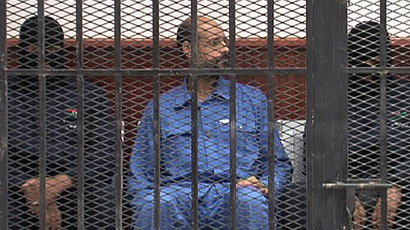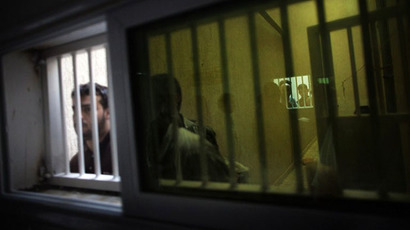Libyan PM freed after capture by former rebels over US raid

Libyan Prime Minister Ali Zeidan spent several hours in captivity after a 'former rebel' militia kidnapped him from a Tripoli hotel in retaliation for his apparent cooperation with a US anti-terror raid.
After Zeidan was freed by his captors unharmed, he urged another militia group who helped in his release to join the regular armed forces.
"Libyans need wisdom ... not escalation ... to deal with this situation," Zeidan said during a televised cabinet meeting.
The AP believes that government forces may have intervened, as it appeared that Zeidan's abductors were not willing to let him go.
A militia commander with ties to the Interior Ministry told a private news channel that another Tripoli-based militia intervened by storming the house where Zeidan was kept, securing his release.
The commander of the intervening militia - calling itself the
'Reinforcement Force' - spoke to Al-Hurrah television, recounting
a gun fight in which his men attacked the building and freed
Zeidan without any harm coming to him.
Security sources first told local media on Thursday morning that armed units grabbed Zeidan from the Corinthia Hotel in the Libyan capital and took him to an unknown location, Reuters says. The reports were later confirmed by a government statement, but government officials could not be reached for comment at the time.
It later turned out Zeidan was seized by the same former rebel
group that is now working with the Interior Ministry to maintain
security in the capital.
Of particular importance here is the nature and origin of the
rebel groups operating in Libya. The war that followed the
toppling of Libya's autocratic ruler, Moammar Gaddafi, sunk the
country into lawlessness and broke it down into rebel units with
changing affiliations, many of which were enlisted to serve in
Libya's security apparatus. However, their loyalties often lay
with their commander - not with government. One such group was
behind Zeidan's seizure. They subsequently released a statement
to the press explaining their actions.
"His arrest comes after the statement by [US Secretary of
State] John Kerry about the capture of Abu Anas el-Liby, after
he said the Libyan government was aware of the operation,"
said a spokesperson for the group calling itself the Operations
Room of Libya's Revolutionaries.
The faction has promised that it will pursue all other people it sees as having anything to do with the recent raid by US forces in collaboration with the Libyan government.
Al Arabiya was earlier citing the country’s justice minister as saying that Zeidan was “kidnapped,” showing also some video stills that clearly displayed Zeidan with a troubling facial expression and with his shirt unbuttoned at the collar. He was being led out by armed men wearing civilian clothes.
A Reuters journalist was on the scene, reporting that protesters
has opened fire on the building where Zeidan was being held,
demanding that the group free the PM.
The rebels say they seized Zeidan in retaliation for his government's role in assisting the US in the recent capture of a suspected top Al-Qaeda leader.

Less than a week ago, the suspect was seized by US forces in a raid in Tripoli. The incident has angered Islamist groups in the country, including the one that is thought to have been involved in the 2012 attack on the US consulate in Benghazi.
The suspected terrorist, Nazih Abdul-Hamed Ruqai, also going by the alias Abu Anas el-Liby, was sought by the US for his alleged participation in the 1998 bombing of US embassies in Kenya and Tanzania.
"The Libyan government is following the news of the kidnapping of a Libyan citizen who is wanted by US authorities,” Zeidan said in the days shortly before being taken, as cited by Reuters. "The Libyan government has contacted US authorities to ask them to provide an explanation."
Zeidan recently expressed fears that if he is accused of complicity with the US over the capture of Liby, which could lead to his confrontation with the Islamist part of the government that came to power following West-helped Muammar Gaddafi’s ousting two years ago.

US State Department spokeswoman Jennifer Psaki said on Thursday
that Washington is seeking more information on the incident.
"We are looking into these reports and we are in close touch with senior US and Libyan officials on the ground," she told the press. "We are working to determine more details. Our embassy staff is safe in Tripoli. We have no further details at this time," Psaki added.
The spokesman for Russia’s ministry of foreign affairs, Aleksandr Lukashevich, spoke to Interfax about the volatility of Libya's security:
“Today’s events concerning the terrorist kidnapping and subsequent return of Libya’s prime minister again serve to show the difficult security problems faced by the country and just how fragile that so-called stability our partners speak of with regard to Syria really is.”
British Foreign Secretary William Hague has lashed out at the kidnapping and demanded Zeidan be set free.
"I condemn the abduction of the Libyan Prime Minister in Tripoli this morning and call for his immediate release," Hague told the press.
"Our Ambassador is in touch with other members of the interim
Government. It is vital that the process of political transition
in Libya is maintained," he added.
Meanwhile, the main body of the Libyan government has denounced
Zeidan's seizure as a 'criminal act,' according to the AP.
Journalist Manuel Ochsenreiter, who specializes on the Middle
East, believes the situation to be a result of a government that
is really run by rebels, and is just one situation in which
interests in post-coup Libya intersect and compete.
“In Libya we see a disintegrated country controlled by warlords – by those gangs who have the biggest guns – and what they do is confusing for us, of course, so I’m not surprised at all,” Ocksenreiter said of the kidnapping. He went on to explain the composition of Libya’s current decision-making apparatus and how it arrived at this state of affairs since Gaddafi’s deposal.
“These were Al-Qaeda gangs, these were jihadis… and they are
today integrated into the Libyan government. We have to see just
one example: Abdelhakim Belhadj – a jihadi with strong links to
Al-Qaeda who became a military commander of the Libyan capital
and is now a politician in Libya. These are the so-called
‘allies’ of the West… [but] you cannot rely on those allies, and
this is the lesson the West receives now. We may see now the
revolution eating its children with this kidnapping now.”
Zeidan goes way back in his dealings with former French President Nicolas Sarkozy. In Europe he was the ‘poster-boy’ for the Libyan revolution, according to Ocksenreiter. He believes that Libya, with its interwoven conflicts over spheres of influence and resources, also has a major split between those so-called ‘poster-boys’ and the extremist elements running amok in the country.
Since Gaddafi's deposal, the country has been in chaos, involving many players and factions all vying for power in different parts of the country, with the government still trying to bring the situation under control.














